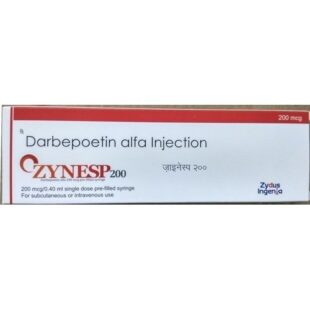- Your cart is empty
- Continue Shopping

Prevenar 13 Injection
Uses of Prevenar 13 Injection
- Meningitis
- Pneumonia
- Sepsis or bacteremia
- Ear infection
Introduction to Prevenar 13 Injection
Prevenar 13 injection is a Pneumococcal Vaccine that is used to prevent disease; In both children (from 6 weeks to 17 years) and adults ( aged 18 years and older), this injection helps to protect against meningitis (inflammation around the brain and spinal cord), sepsis or bacteremia (bacteria in the bloodstream), pneumonia (lung infection), and ear infection caused by 13 different types of Streptococcus pneumoniae bacteria. It makes the body produce antibodies to protect the body against the disease.
Do not take Prevenar 13 injection if you are allergic to the Pneumococcal vaccine or any other ingredients in this medicine or any other vaccine with diphtheria toxoid. Also, do not take it if you have a severe infection with a fever (over 38°C). Before starting the treatment, inform your doctor about present and past medical problems, breathing problems, bleeding, and bruising condition. Inform your doctor if you have a low resistance to the infection (weekend immune system or seizures.
Notify your doctor if your child is prematurely born (at or before 28 weeks of gestation). Inform your doctor if you are pregnant or planning to get pregnant or think you might be pregnant or breastfeeding. Do not self-administer. A well-trained doctor should inject Prevenar 13 injection.
Therapeutic Effects of Prevenar 13 Injection
Prevenar 13 injection triggers the immune system to produce more antibodies that protect against infections.
Interaction of Prevenar 13 Injection with other drugs
Inform your doctor about any prescribed medications, over-the-counter medicines, nutritional or vitamin supplements, and herbal products you take or have taken before the treatment. Certain medications may interact with Prevenar 13 injection and can cause undesirable side effects.
More Information about Prevenar 13 Injection
- Keep this medicine out of the sight and reach of children.
- Store in a refrigerator (2°C to 8°C).
- Do not freeze.
How to consume Prevenar 13 Injection
Prevenar 13 injection is administered into a muscle or deep under the skin. If this injection is recommended for you, it will be given by a healthcare professional. Do not self-administrate. Your physician will choose the dosage and administration frequency based on the medical condition because it differs for each person.
A second dose of Prevenar 13 injection is not usually given until at least three years after the first dose. Healthy people do not usually need a second dose; however, persons at increased risk of serious pneumococcal infection (such as those with no spleen or a spleen that does not work properly) may be suggested.
Safety Advices for Prevenar 13 Injection
Pregnancy
Inform your medical profession if you are pregnant or think you may be pregnant, or are planning to have a baby or breastfeeding. Ask for the suggestion before taking Prevenar 13 injection.
Breast Feeding
It is unknown whether the ingredient of Prevenar 13 injection passes to the breast milk. Inform your doctor to get advice regarding breastfeeding.
Lungs
It is unknown whether Prevenar 13 injection is safe for patients with lung problems. Inform your physician if you have any lung disease before starting the treatment. Contact your doctor if you experience any lung-related symptoms
Liver
It is unknown whether Prevenar 13 injection is safe for patients with lung problems. Inform your physician if you have any lung disease before starting the treatment. Contact your doctor if you experience any liver -related symptoms.
Alcohol
It is unknown whether consuming alcohol while taking a Prevenar 13 injection is safe. Please speak with your physician.
Driving
It is unknown whether Prevenar 13 injection alters the ability to drive or operate the machine. Consult your doctor for more information. However, if you experience any side effects, avoid driving.
Side Effects of Prevenar 13 Injection
Side Effects are unwanted symptoms caused by medicines. Although all medicines cause side effects, not everyone gets them.
Serious
- Difficulty in breathing
- Blue discoloration of lips or tongue
- Dizziness
- Fever
- Joint swelling
- Muscle pain
- Swelling of lips, tongue, throat, neck, hand, feet, or ankles
- Skin hives and rashes
Common
- Swelling and hardening at the injection site
- Soreness
- Pain
- Redness


